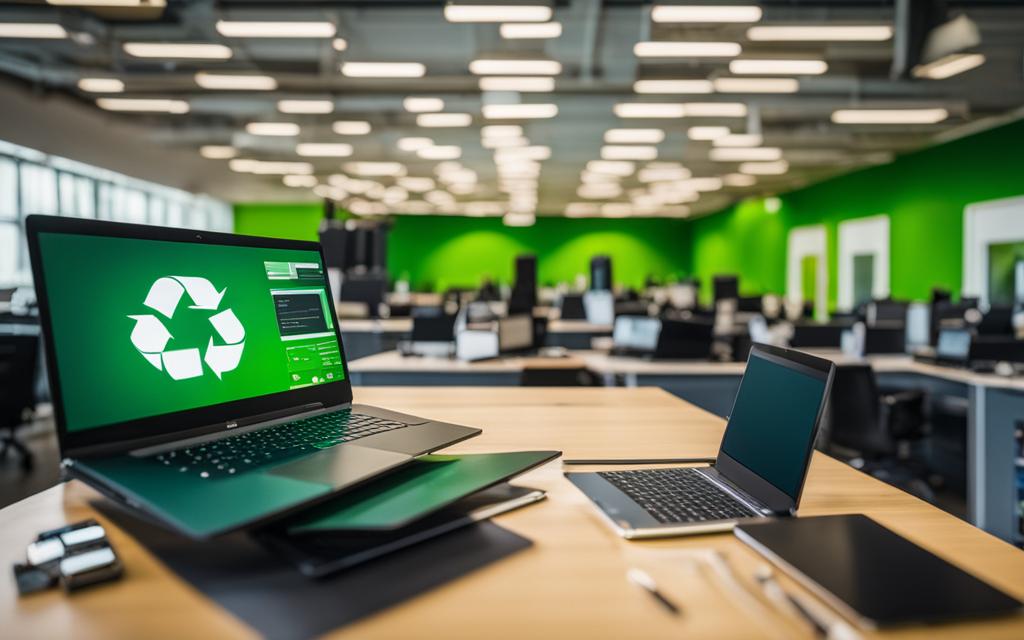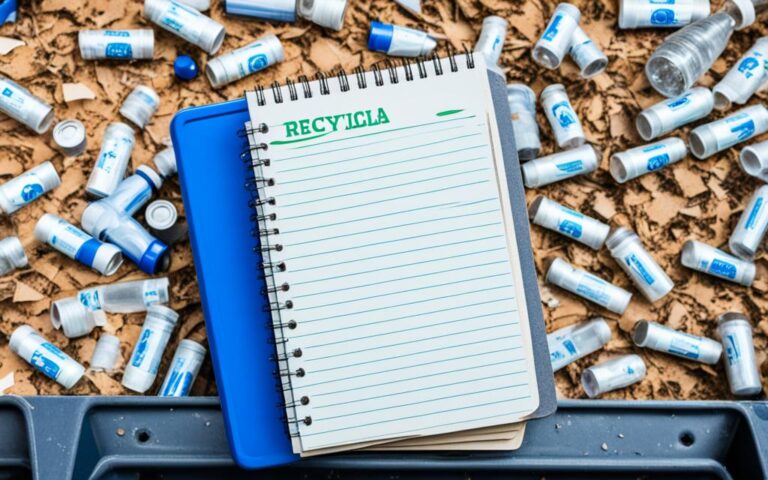The Importance of Laptop Recycling in the Gig Economy
In today’s gig economy, where technology plays a central role in driving businesses forward, laptop recycling has become more crucial than ever. As individuals and companies increasingly rely on laptops for their work, the question of what to do with old or obsolete devices becomes essential. Recycling these laptops not only benefits the environment but also contributes to the sustainability and reputation of businesses operating in the gig economy.
Partnering with a commercial recycling company can help businesses establish and maintain a suitable laptop recycling program. This ensures that laptops and other electronic devices are disposed of responsibly, reducing waste impact on the environment. Modern recycling methods make it easier to recycle various components of laptops, such as paper, plastic, metal, and electronic equipment, diverting them from landfills.
By embracing laptop recycling in the gig economy, businesses can save money on waste disposal costs and demonstrate commitment to environmental sustainability. Additionally, responsible laptop recycling helps reduce the environmental impacts of electronic waste, including the release of greenhouse gases and the pollution of air and water sources. Taking a proactive approach towards laptop recycling not only benefits businesses but also contributes to a greener and more sustainable future.
The Advantages of Recycling Business Waste
Recycling business waste offers numerous advantages for companies. It can save them money by reducing waste disposal costs. Moreover, businesses that actively recycle their waste can attract new customers and improve customer loyalty. By caring about business waste and taking action to recycle, companies can enhance their reputation and demonstrate their commitment to environmental sustainability. Recycling also helps reduce the overall impact of business waste on the environment by diverting it from landfill.
Cost Savings
One of the key benefits of recycling business waste is the potential for cost savings. By implementing effective recycling practices, companies can reduce waste disposal costs associated with landfill fees. Instead of paying to dispose of waste, businesses can redirect those funds towards other areas of their operations, contributing to financial efficiency and sustainability.
Customer Attraction and Loyalty
Today, consumers are increasingly choosing businesses that prioritize sustainability and environmental responsibility. By actively recycling their waste, companies can attract new customers who align with their values. Additionally, demonstrating a commitment to recycling can improve customer loyalty, prompting existing customers to continue supporting the business and recommending it to others. Recycling business waste thus becomes a powerful marketing tool.
“Companies that care about their impact on the environment and take action to recycle demonstrate their commitment to sustainability.”
Reputation Enhancement
Recycling business waste not only benefits the environment but also enhances a company’s reputation. By prioritizing sustainable waste management practices, businesses can position themselves as responsible corporate citizens. This positive reputation not only attracts customers but also appeals to potential partners, investors, and employees who value environmental stewardship and seek to collaborate with socially conscious organizations.
Environmental Impact Reduction
Diverting business waste from landfill helps reduce its overall impact on the environment. Landfills produce greenhouse gases, contribute to soil and water pollution, and occupy valuable land resources. By recycling waste materials, companies can minimize the need for additional landfill space and decrease harmful emissions. Recycling also conserves natural resources and helps create a more sustainable future.
The Environmental Impact of Poor Waste Management
Poor waste management practices have significant environmental consequences. Improper waste disposal leads to waste accumulation in landfills, resulting in the release of potent greenhouse gases like methane. These gases contribute to climate change. Additionally, inadequate waste management causes air and water pollution, affecting both humans and wildlife. Plastic waste, in particular, poses a pressing issue as it ends up in oceans and waterways, harming marine life and ecosystems. Managing waste properly is crucial to mitigate these environmental impacts.
“Proper waste management is essential for preserving our environment and protecting future generations. It’s not just about disposing of waste; it’s about doing it responsibly and sustainably.”
Poor waste management practices result in a range of environmental consequences that affect both the local and global ecosystems. One of the most significant impacts is the accumulation of waste in landfills. When waste is not managed properly, it piles up in landfills, emitting harmful gases such as methane into the atmosphere. Methane is a potent greenhouse gas that contributes to climate change, trapping heat and leading to rising global temperatures.
Inadequate waste management also contributes to air and water pollution, posing risks to human health and wildlife. Improperly disposed waste can leach harmful substances into the soil and water, contaminating local ecosystems and endangering vulnerable species. Plastic waste, a major component of poor waste management, is particularly detrimental to marine environments. It often ends up in oceans and waterways, endangering marine life and disrupting delicate ecosystems.
Addressing waste management issues is crucial to alleviate these environmental impacts. By implementing effective waste management strategies, such as proper recycling and waste reduction measures, we can minimize waste accumulation in landfills, reduce greenhouse gas emissions, and protect our air and water quality.
The Importance of Responsible Waste Management
Proper waste management practices not only have a positive environmental impact but also promote sustainable development and resource conservation. By adopting responsible waste management strategies, we can:
- Minimize greenhouse gas emissions: Effective waste management reduces the release of methane and other potent greenhouse gases, which helps mitigate climate change.
- Protect ecosystems and wildlife: Responsible waste disposal prevents the pollution of ecosystems and safeguards the habitats of wildlife, ensuring their long-term survival.
- Promote resource conservation: Recycling and waste reduction efforts conserve valuable resources by reducing the demand for raw materials and energy.
- Improve public health: Adequate waste management prevents the spread of diseases and reduces the risks associated with contaminated air, water, and soil.
Infographic: Environmental Impact of Poor Waste Management
| Environmental Consequences of Poor Waste Management | Impact |
|---|---|
| Waste Accumulation | Release of greenhouse gases, contributing to climate change |
| Air and Water Pollution | Endangering human health, wildlife, and ecosystems |
| Persistent Plastic Waste | Contamination of oceans, harming marine life |
It is evident that proper waste management is critical for safeguarding our environment and creating a sustainable future. By implementing effective waste management practices and raising awareness about the importance of responsible waste disposal, we can reduce the environmental impact of poor waste management and pave the way for a cleaner and healthier planet.
Shifting Towards a Sustainable Approach: Clean Technology in Waste Management
The waste management industry is embracing clean technology as a more sustainable approach. Clean technology involves using innovative and eco-friendly methods to minimize waste generation, improve recycling, and utilize renewable energy sources for waste treatment.
Waste-to-energy conversion technologies, advanced recycling techniques, and smart waste management systems are paving the way for a more efficient and environmentally friendly waste management approach. These technologies and systems not only reduce the environmental impact of waste but also have the potential to create valuable resources from what was once considered waste.
The concept of a circular economy, where waste is minimized and resources are reused, repaired, or recycled, is playing a significant role in shaping the future of waste management. By adopting a circular economy model, the waste management industry can move away from the linear “take-make-dispose” approach and embrace a more sustainable and resource-efficient system.
“Clean technology in waste management enables us to transform our approach from waste disposal to resource recovery. It allows us to minimize waste, maximize resource utilization, and contribute to a greener and more sustainable future.”
– Dr. Emily Davis, Environmental Scientist
Embracing clean technology in waste management not only benefits the environment but also presents numerous economic opportunities. The implementation of clean technologies can lead to the creation of new jobs, the growth of sustainable industries, and increased economic resilience.
Furthermore, sustainable waste management practices supported by clean technology contribute to the achievement of the United Nations’ Sustainable Development Goals, particularly Goal 12: Responsible Consumption and Production. By adopting clean technology and embracing sustainable waste management practices, we can move closer to a waste-free future and ensure the well-being of both the planet and future generations.
The Advantages of Clean Technology in Waste Management
Clean technology offers several advantages in the field of waste management:
- Reduced environmental impact: Clean technology minimizes waste generation, reduces pollution, and lowers greenhouse gas emissions, leading to a healthier environment.
- Improved resource efficiency: By utilizing advanced recycling techniques and waste-to-energy conversion technologies, clean technology maximizes the utilization of valuable resources, reducing the need for extractive practices.
- Economic benefits: Clean technology in waste management creates new economic opportunities, driving job creation and sustainable economic growth.
- Enhanced public health: By reducing pollution and properly managing waste, clean technology contributes to improved public health outcomes.
By leveraging the potential of clean technology in waste management, we can transition towards a more sustainable future where waste is minimized, resources are conserved, and the well-being of both human and natural systems is preserved.
| Types of Clean Technology in Waste Management | Description |
|---|---|
| Waste-to-Energy Conversion | Technologies that convert waste into energy, such as incineration and anaerobic digestion, reducing the dependence on fossil fuels and mitigating the environmental impact of waste. |
| Advanced Recycling Techniques | Innovative recycling processes that enable the recovery of valuable materials from waste, minimizing resource extraction and reducing the need for landfill disposal. |
| Smart Waste Management Systems | Integrated systems using sensors, data analysis, and automation to optimize waste collection, improve recycling rates, and enhance overall waste management efficiency. |
| Circular Economy Practices | A holistic approach that aims to close the loop on resource usage, promoting the reutilization, repair, and recycling of materials to minimize waste generation and maximize resource efficiency. |
Implementing clean technology in waste management is crucial for achieving sustainable waste management practices and creating a more circular economy. By embracing clean technology, we can transform waste into valuable resources, reduce environmental impact, and build a more sustainable future for all.
Success Stories in Clean Waste Management
When it comes to clean waste management, many cities and companies have achieved remarkable success. These success stories showcase the effectiveness of innovative approaches in achieving sustainable waste management goals.
Singapore’s Integrated Waste Management Facility
Singapore’s Integrated Waste Management Facility is a shining example of clean waste management practices. This facility utilizes advanced waste-to-energy technologies to process and incinerate solid waste, while simultaneously generating electricity. By harnessing the power of waste, Singapore not only minimizes waste accumulation but also contributes to its energy needs in a sustainable manner.
Toyota’s Zero Waste to Landfill Initiative
Toyota has taken a proactive stance on waste management through its Zero Waste to Landfill initiative. The company emphasizes recycling, composting, and energy recovery methods to eliminate waste sent to landfills. By embracing these practices, Toyota showcases its commitment to sustainability and demonstrates that clean waste management is both feasible and economically beneficial.
Copenhagen’s Integration of Waste Management and District Heating
In Copenhagen, waste management has been seamlessly integrated with the district heating system. This innovative approach involves converting waste heat from the disposal process into sustainable district heating for residential and commercial use. By repurposing waste heat, Copenhagen not only reduces the environmental impact of waste management but also provides an efficient and eco-friendly heating solution for its citizens.
These success stories highlight the positive outcomes that can be achieved through clean waste management. By adopting innovative approaches and leveraging advanced technologies, cities and companies are demonstrating that sustainable waste management practices are not only possible but also beneficial for both the environment and the economy.
| City/Company | Approach |
|---|---|
| Singapore’s Integrated Waste Management Facility | Utilizing waste-to-energy technologies for solid waste processing and electricity generation. |
| Toyota’s Zero Waste to Landfill Initiative | Implementing recycling, composting, and energy recovery methods to eliminate landfill waste. |
| Copenhagen | Integrating waste management with the district heating system to convert waste heat into sustainable district heating. |
These success stories provide inspiration and insights for other cities and companies to embrace clean waste management practices. By leveraging technology and adopting innovative approaches, we can create a more sustainable future for waste management.
Overcoming Challenges and Future Outlook
Adopting clean technology in waste management presents various challenges that necessitate careful consideration. Some of the key obstacles include:
- Initial investment costs
- Technological feasibility
- Public acceptance
These challenges may impede the widespread adoption of clean technology solutions. However, it is crucial to educate stakeholders about the long-term environmental benefits and cost savings associated with sustainable waste management practices. By emphasizing the positive impact on the environment and financial advantages, skepticism can be overcome, paving the way for cleaner and more efficient waste management systems.
Moreover, supportive regulatory frameworks and policies play a crucial role in facilitating the full potential of clean technology adoption in waste management. Incentives and enforcement mechanisms can encourage businesses and communities to embrace sustainable practices, providing the necessary infrastructure and guidance.
The future of waste management looks promising, thanks to rapid advancements in clean technology. These innovations offer numerous opportunities to revolutionize waste management practices, making them more efficient and eco-friendly than ever before.
“The challenges we face today in clean technology adoption will shape the future of waste management and determine the sustainability of our planet.” – Jane Clarke, Environmental Scientist
The Future of Waste Management
The future of waste management holds immense potential for positive change. As clean technology continues to advance, various exciting developments can be anticipated. These include:
- Innovative waste-to-energy conversion technologies
- Advanced recycling techniques
- Smart waste management systems
By embracing these technologies and integrating them into waste management strategies, we can strive towards a more sustainable and efficient approach. The concept of a circular economy, where waste is minimized, resources are reused, repaired, or recycled, will play a fundamental role in this transformation.
| Advantages of Future Waste Management | Benefit |
|---|---|
| Reduced environmental impact | Minimized greenhouse gas emissions, decreased pollution, and improved conservation of natural resources. |
| Enhanced resource efficiency | Maximized resource recovery through recycling and extraction of valuable materials from waste. |
| Economic growth | Creation of new job opportunities and the emergence of a green economy. |
| Improved public health | Reduction in exposure to harmful substances and prevention of water and air pollution. |
The future of waste management lies in our hands. By overcoming the challenges and embracing the opportunities presented by clean technology, we can pave the way towards a sustainable future, where waste is minimized and resources are used wisely.
Conclusion
Clean technology and sustainable waste management practices are essential in achieving a waste-free future. By adopting innovative approaches and technologies such as waste-to-energy conversion, advanced recycling, and smart waste management, we can effectively minimize waste generation, conserve valuable resources, and reduce our environmental impact.
Embracing the principles of the circular economy and implementing supportive regulatory frameworks will further accelerate the transition towards sustainable waste management practices. By seizing these opportunities, we can pave the way for a thriving and sustainable environment for future generations.
Together, we can create a waste-free future by prioritizing sustainable waste management, implementing clean technologies, and fostering a collective commitment to environmental responsibility. By making conscious choices today, we can work towards a better tomorrow, where our waste is minimized, resources are conserved, and our planet thrives.
FAQ
What is the importance of laptop recycling in the gig economy?
Laptop recycling plays a crucial role in the gig economy, benefiting both the technology sector and the environment. By properly recycling laptops and other electronic devices, businesses can save money, reduce waste impact on the environment, and improve their reputation.
What are the advantages of recycling business waste?
Recycling business waste offers numerous advantages for companies. It can save them money by reducing waste disposal costs. Moreover, businesses that actively recycle their waste can attract new customers and improve customer loyalty. By caring about business waste and taking action to recycle, companies can enhance their reputation and demonstrate their commitment to environmental sustainability.
What is the environmental impact of poor waste management?
Poor waste management practices have significant environmental consequences. Improper waste disposal leads to waste accumulation in landfills, resulting in the release of potent greenhouse gases like methane. These gases contribute to climate change. Additionally, inadequate waste management causes air and water pollution, affecting both humans and wildlife. Managing waste properly is crucial to mitigate these environmental impacts.
How is clean technology shaping waste management practices?
The waste management industry is embracing clean technology as a more sustainable approach. Clean technology involves using innovative and eco-friendly methods to minimize waste generation, improve recycling, and utilize renewable energy sources for waste treatment. Waste-to-energy conversion technologies, advanced recycling techniques, and smart waste management systems are paving the way for a more efficient and environmentally friendly waste management approach. The concept of a circular economy, where waste is minimized and resources are reused, repaired, or recycled, is playing a significant role in shaping the future of waste management.
Can you provide some success stories in clean waste management?
Many cities and companies have successfully embraced clean waste management practices. Singapore’s Integrated Waste Management Facility utilizes advanced waste-to-energy technologies to process and incinerate solid waste while generating electricity. Toyota’s Zero Waste to Landfill initiative focuses on recycling, composting, and energy recovery methods to eliminate waste sent to landfills. Copenhagen has integrated waste management with its district heating system, converting waste heat into sustainable district heating for residential and commercial use. These success stories highlight the effectiveness of clean waste management initiatives.
What are the challenges in adopting clean technology for waste management?
Adopting clean technology in waste management faces challenges such as initial investment costs, technological feasibility, and public acceptance. However, educating stakeholders about the environmental benefits and long-term cost savings can help overcome skepticism. Supportive regulatory frameworks and policies that incentivize and enforce sustainable practices are crucial for fully harnessing the potential of clean technology in waste management. Despite these challenges, rapid advancements in clean technology offer promising opportunities to revolutionize waste management practices, making them more efficient and eco-friendly.
How can clean technology and sustainable waste management practices contribute to a waste-free future?
Clean technology and sustainable waste management practices are vital for creating a waste-free future. By adopting innovative approaches and technologies such as waste-to-energy conversion, advanced recycling, and smart waste management, we can minimize waste generation, conserve resources, and reduce environmental impact. Embracing circular economy principles and implementing supportive regulatory frameworks will further accelerate the transition to sustainable waste management practices. By seizing these opportunities, we can pave the way toward a thriving and sustainable environment for future generations.















